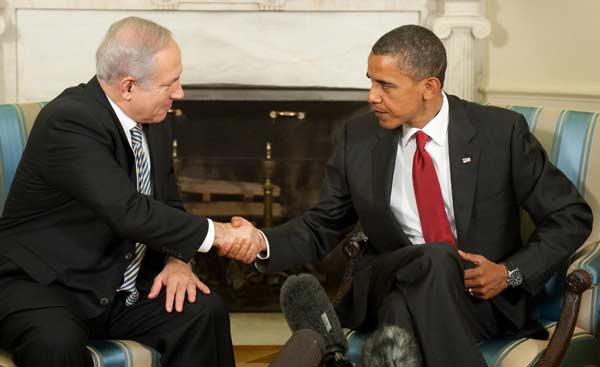U.S., Israel patch up spat, but tensions could resume
U.S. and Israeli leaders on Tuesday trumpeted what they billed as an unwavering bond between the two countries, nearly four months after a public dust up that some called the worst in years.
 |
|
U.S. President Barack Obama (R) meets with Israeli Prime Minister Benjamin Netanyahu in the Oval Office at the White House in Washington, July 6, 2010. [Xinhua/AFP Photo] |
But in spite of the cordiality that characterized Israeli Prime Minister Benjamin Netanyahu's visit to Washington, analysts warned that another diplomatic crisis could break out in September.
At a press conference, both leaders touted the strength of the relationship, and U.S. President Barack Obama said the bond between Israel and the United States is "unbreakable."
"It encompasses our national security interests, our strategic interests, but most importantly, the bond of two democracies who share a common set of values and whose people have grown closer and closer as time goes on," Obama said.
Netanyahu echoed those sentiments, saying reports of weakening ties between the two countries were "just flat wrong."
Israeli officials scrambled to show progress toward the peace process, in which Obama has invested much time and political capital, in the days ahead of the prime minister's visit, partly in a bid to warm relations with Washington, some analysts said.
Israeli officials on Monday announced steps to ease the Gaza blockade -- a move Obama commended on Tuesday -- and Israel's defense minister held a direct meeting with the Palestinian prime minister.
But a ten-month freeze on Israeli settlements in the West Bank is slated to end in September, and failure to extend the moratorium could spark another round of strained U.S.-Israeli relations, as the Obama administration has called for an end to Israeli settlements in the area.
Indeed, Israeli Foreign Minister Avigdor Lieberman said Tuesday that there is "no chance" of an extension on the freeze on Jewish settlements in the West Bank, Bloomberg reported.
Still, another U.S.-Israel diplomatic breakdown might be averted if the Palestinians agree to hold a round of direct talks with Israel before the September deadline, which could spur Israel to extend the settlement freeze, said David Pollock, senior fellow at the Washington Institute for Near East Policy.
Such a move, however, could also spark a reshuffling of Israel' s coalition government, as some members may defect in protest of a settlement freeze.
 0
0 







Go to Forum >>0 Comments